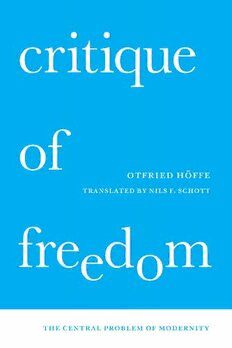
Critique of Freedom: The Central Problem of Modernity PDF
Preview Critique of Freedom: The Central Problem of Modernity
Critique of Freedom critique of Otfried Höffe translated by nils f. scHOtt fre d m e o tHe central PrOblem Of mOdernity The University of Chicago Press Chicago and London The University of Chicago Press, Chicago 60637 The University of Chicago Press, Ltd., London © 2020 by The University of Chicago All rights reserved. No part of this book may be used or repro- duced in any manner whatsoever without written permission, except in the case of brief quotations in critical articles and re- views. For more information, contact the University of Chicago Press, 1427 E. 60th St., Chicago, IL 60637. Published 2020 Printed in the United States of America 29 28 27 26 25 24 23 22 21 20 1 2 3 4 5 ISBN- 13: 978- 0- 226- 46590- 6 (cloth) ISBN- 13: 978- 0- 226- 46606- 4 (e- book) DOI: https:// doi .org/10.7208 /chicago/9780226466064.001.0001 Originally published in German as Kritik der Freiheit. Das Grund problem der Moderne © Verlag C.H.Beck oHG, München 2015. The translation of this work was funded by Geisteswissenschaften International— Translation Funding for Work in the Humanities and Social Sciences from Germany, a joint initiative of the Fritz Thyssen Foundation, the German Federal Foreign Office, the col- lecting society VG WORT, and the Börsenverein des Deutschen Buch handels (German Publishers & Booksellers Association). Library of Congress Cataloging-in-Publication Data Names: Höffe, Otfried, author. | Schott, Nils F., translator. Title: Critique of freedom : the central problem of modernity / Otfried Höffe ; translated by Nils F. Schott. Other titles: Kritik der Freiheit. English Description: Chicago : The University of Chicago Press, 2020. | Includes bibliographical references and index. Identifiers: LCCN 2020026483 | ISBN 9780226465906 (cloth) | ISBN 9780226466064 (ebook) Subjects: LCSH: Liberty—Philosophy. | Civilization, Modern— Philosophy. | Philosophy, Modern. | Ethics, Modern. Classification: LCC B824.4 .H6413 2020 | DDC 123/ .5—dc23 LC record available at https:// lccn.loc .gov/ 2020026483 ♾This paper meets the requirements of ANSI/NISO Z39.48- 1992 (Permanence of Paper). Freedom in free association For Evelyn Contents Preface ix 1. Putting Freedom and Modernity to the Test — 1 Part i: freedOm frOm natural cOnstraints — 23 2. External Cultivation: Technology — 25 3. Medicine — 38 4. Inner Cultivation: Education to Freedom — 61 Part ii: freedOm in ecOnOmy and sOciety — 77 5. Enlightened Liberalism — 79 6. Free Market: Vision or Illusion? — 95 7. Justice in the Name of Freedom — 114 8. Free Society — 129 Part iii: science and art — 143 9. Knowledge and Freedom — 145 10. Freedom and Creativity: Art — 158 Part iV: POlitical freedOm — 173 11. Constitutional Democracy — 175 12. Liberties — 192 13. Minimal Citizen, State Citizen, World Citizen — 208 14. Sovereignty in an Age of Globalization — 223 15. A Liberal Global Order — 237 Part V: PersOnal freedOm — 245 16. A New Conflict of the Faculties — 247 17. Personal Autonomy — 266 18. On the Price of Freedom — 278 19. Retrospection: Freedom and Modernity — 285 Notes 287 Index 311 Preface Freedom is humanity’s highest good. It constitutes human dignity. Not surpris- ingly, freedom in various ways shapes all human history. It therefore assumes a preeminent position in two respects, anthropologically and with regard to a specific age. To understand this double status, we must overcome a widespread but narrow conception of freedom. Freedom is not just a political topic and, merely as a supplement, one of personal responsibility. To take on the much vaster theme of freedom is to engage with a tricky and convoluted phenomenon. For example, freedom is constitutive of the human being, and nonetheless, it remains a task still to be accomplished. And for ac- complishing this task, in turn, modernity has elaborated a highly sophisticated, multifaceted project. There is, however, skepticism toward this project, and thus toward freedom. In evidence, skeptics cite the negative consequences of modernity and the flip- sides of the project of freedom. This book takes such skepticism seriously. It subjects freedom and, with it, modernity to a judicative critique. For, without possessing an exclusive right to it, modernity is of overwhelming importance for freedom, while, inversely, freedom in its numerous versions plays an out- standing role in modernity. My study thus conceives of itself as a contribution both to a philosophical anthropology and to a critical theory of freedom and modernity. And because furthermore, it understands itself to be a reflection on the situation of our time, it joins the tradition of a truly practical and po- litical philosophy. I have developed reflections toward a critical theory of freedom and mo- dernity in earlier works, namely, in Categorical Principle of Law: A Counterpoint of Modernity (1990), Morality as the Price of Modernity (1993), and Kant’s Critique of Pure Reason: The Foundation of Modern Philosophy (2003). In this book, I continue my discussions from The Art of Life and Morality (2007) and the interpretation of Kant’s Critique of Practical Reason: A Philosophy of Freedom (2012) with the aim of outlining a more comprehensive theory.1
